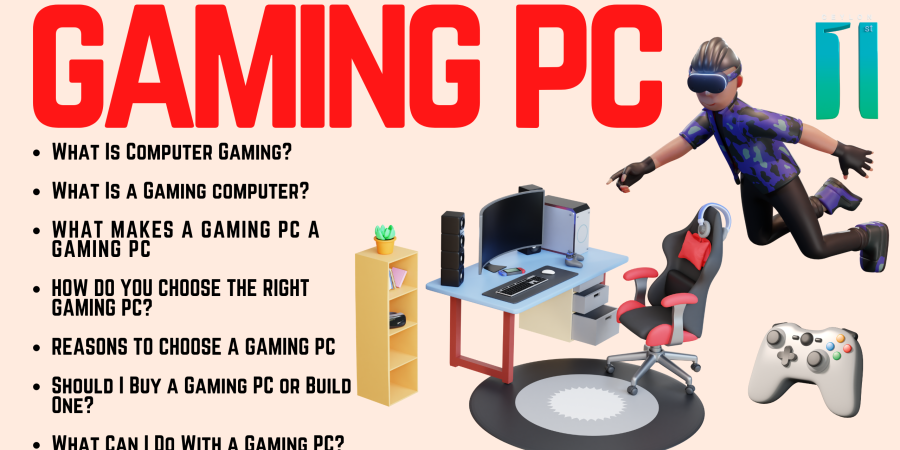A gaming computer, also known as a gaming PC, is a type of computer that is specifically designed and optimised for playing video games. Gaming computers typically have high-end hardware components, such as powerful processors, graphics cards, and large amounts of RAM, that enable them to handle the demanding requirements of modern video games.
Gaming computers also often have specialized features and components that are tailored to the needs of gamers. For example, they may have high-performance cooling systems to prevent overheating during intense gaming sessions, and may have customizable lighting and other aesthetic features to enhance the gaming experience.
Gaming computers can range in price from several hundred dollars to several thousand dollars, depending on the specific components and features included. Many gamers prefer to build their own gaming computers, as this allows them to customize the hardware and software to their specific needs and preferences.
What Makes a Gaming PC a Gaming PC?
A gaming PC is typically characterized by its high-performance hardware components that are designed to provide the power and speed required for playing modern video games. Some key features that make a gaming PC a gaming PC include:
- Graphics card: A dedicated graphics card is essential for gaming, as it provides the necessary processing power to render high-quality images and animations.
- Processor: A high-performance processor is also important, as it helps to run the game smoothly and quickly.
- RAM: Gaming requires a lot of memory, so a gaming PC typically has more RAM than a regular computer, with at least 8GB being common.
- Cooling system: Gaming can generate a lot of heat, so gaming PCs often have specialized cooling systems to keep the hardware from overheating.
- Storage: Gaming requires a lot of storage space, so gaming PCs often have larger hard drives or solid-state drives (SSDs) to accommodate the large game files.
- Customization: Many gaming PCs are highly customizable, with options to upgrade or replace hardware components to meet the needs of the user.
- Aesthetics: Gaming PCs often feature striking designs and lighting effects, which can enhance the gaming experience and create a more immersive environment.
Overall, a gaming PC is designed to provide the high-performance hardware required to run modern video games, and often offers customization and aesthetics to create a personalized gaming experience.
How do you choose the right gaming PC?
Choosing the right gaming PC can be a complex process, as there are many different factors to consider. Here are some key considerations when choosing a gaming PC:
- Budget: Gaming PCs can range in price from a few hundred dollars to several thousand dollars. Determine how much you’re willing to spend on a gaming PC before starting your search.
- Graphics card: The graphics card is one of the most important components for gaming. Look for a PC with a high-end graphics card that can handle the latest games.
- Processor: A powerful processor is also essential for gaming. Look for a PC with a fast and modern CPU.
- RAM: Gaming requires a lot of memory, so look for a PC with at least 8GB of RAM.
- Storage: Gaming requires a lot of storage space, so look for a PC with a large hard drive or solid-state drive (SSD) that can accommodate your game library.
- Cooling system: Gaming can generate a lot of heat, so look for a PC with a high-quality cooling system to keep the components from overheating.
- Customization: Consider whether you want a PC that can be customized and upgraded over time to meet your evolving gaming needs.
- Brand reputation: Choose a PC from a reputable brand with good customer reviews and reliable customer support.
Overall, when choosing a gaming PC, it’s important to find a balance between performance, price, and personal preferences. Consider the above factors to help narrow down your options and find the right gaming PC for your needs.
Reasons to choose a gaming PC?
There are several reasons why someone might choose a gaming PC over other gaming options:
- High-performance hardware: Gaming PCs are designed with high-performance hardware components, such as powerful CPUs, graphics cards, and large amounts of RAM, that can provide faster processing and higher-quality graphics compared to other gaming options.
- Customizability: Gaming PCs can be customized to meet specific needs and preferences, with options to upgrade or replace hardware components over time.
- Game selection: Many games are designed specifically for PC, and may not be available on other gaming platforms.
- Modding: PC gaming offers the ability to mod games, allowing players to customize and alter game mechanics, graphics, and more.
- Multi-tasking: Gaming PCs can also be used for other tasks, such as video editing or running multiple applications simultaneously, making them a versatile option for both work and play.
- Community: PC gaming offers a vibrant community of gamers, with forums, social media groups, and streaming platforms that allow players to connect with each other, share experiences, and learn from each other.
Overall, gaming PCs offer high performance, customisability, game selection, modding, multi-tasking capabilities, and a vibrant community that make them a popular choice for many gamers.
What Can I Do With a Gaming PC?
There are many things you can do with a gaming PC beyond just playing games. Here are some examples:
- Game streaming: You can use your gaming PC to stream your gameplay on platforms like Twitch or YouTube, allowing you to share your gaming experiences with others.
- Video editing: Gaming PCs are equipped with powerful hardware, making them a great option for video editing, as they can handle demanding tasks like rendering high-resolution videos quickly and efficiently.
- 3D modeling and animation: Gaming PCs are also suitable for 3D modeling and animation, as they can handle the high processing requirements needed for these tasks.
- Virtual reality: Gaming PCs are often used for virtual reality (VR) experiences, as they can provide the processing power needed for smooth and immersive gameplay.
- Productivity: Gaming PCs can also be used for productivity tasks such as running multiple applications simultaneously, making them a versatile option for both work and play.
- Web browsing and media consumption: You can use your gaming PC for browsing the web, streaming movies, and other media consumption.
Overall, gaming PCs offer high-performance hardware that can handle a wide range of tasks, making them a versatile option for work and play. While gaming is one of the main uses for a gaming PC, there are many other possibilities for how you can utilise this powerful hardware.
Should I Buy a Gaming PC or Build One?
Whether to buy a pre-built gaming PC or build one yourself depends on several factors. Here are some things to consider:
- Budget: Building your own gaming PC can be more cost-effective than buying a pre-built one, as you can select each component yourself and potentially save money by choosing less expensive options. However, building a PC requires a certain level of technical expertise, and mistakes can be costly.
- Customization: Building your own PC allows you to customize it to your exact needs and preferences, selecting the exact components you want for your build. Pre-built PCs may not offer as much flexibility in terms of customization options.
- Time and effort: Building a PC requires time, effort, and technical expertise. If you’re not comfortable working with hardware or don’t have the time to invest in researching and building a PC, a pre-built gaming PC may be a better option for you.
- Warranty and support: Pre-built gaming PCs usually come with a warranty and technical support, which can be reassuring if you run into any issues. If you build your own PC, you’ll need to troubleshoot any problems yourself and may not have the same level of support.
- Upgradeability: Building your own PC can make it easier to upgrade components over time, as you’ll be familiar with the build and how to work with the hardware. Pre-built PCs may be more challenging to upgrade, depending on how they’re designed.
Overall, whether you should buy a pre-built gaming PC or build one yourself depends on your technical expertise, budget, customization needs, and time availability. If you have the technical expertise and want to customize your PC to your exact needs, building your own gaming PC may be the better option. However, if you prefer a hassle-free solution with warranties and support, a pre-built gaming PC may be the better choice.
What is the difference between Gaming PC and Gaming Rig?
In general, the terms “gaming PC” and “gaming rig” are often used interchangeably to describe a high-performance computer system designed specifically for gaming. However, some people might use the term “gaming rig” to refer to an especially powerful or customized gaming PC.
A gaming PC is typically a computer system that is optimized for gaming, with high-performance components such as a powerful CPU, a dedicated graphics card, and a large amount of RAM. A gaming PC can be pre-built or custom-built, and it can range in price from a few hundred dollars to several thousand dollars, depending on the specifications.
A gaming rig, on the other hand, is often used to describe a particularly high-end or customized gaming PC. A gaming rig might include the latest and most powerful hardware components available, custom water-cooling systems, or advanced lighting and aesthetics. The term “rig” may also imply a degree of modding or customization that goes beyond what is typical for a standard gaming PC.
In short, while both terms refer to high-performance gaming computers, “gaming rig” is often used to describe an especially powerful or customized gaming PC, while “gaming PC” is a more general term that can encompass a wide range of computer systems designed for gaming.
Pros and cons of gaming PC?
Here are some pros and cons of gaming PCs:
Pros:
- Performance: Gaming PCs are designed to provide the best possible gaming experience, with high-end hardware that can run demanding games at high resolutions and framerates.
- Customization: Gaming PCs can be customized to suit individual preferences and needs, with the ability to choose and upgrade components as needed.
- Versatility: While gaming is the primary use case for gaming PCs, they can also be used for a wide range of other tasks, such as video editing, 3D modeling, and productivity.
- Immersive gaming: Gaming PCs can provide immersive gaming experiences, with features like high-resolution displays, VR support, and advanced lighting and sound systems.
- Longevity: Gaming PCs are typically built to last, with the ability to upgrade components over time to keep up with new technology and game releases.
Cons:
- Cost: Gaming PCs can be expensive, with high-end components and advanced features driving up the price.
- Complexity: Building or upgrading a gaming PC requires technical expertise, which may not be accessible to everyone. Pre-built gaming PCs are available, but they may not offer the same level of customization as a self-built PC.
- Maintenance: Gaming PCs require regular maintenance, such as dusting and cleaning, to keep them running smoothly and prevent hardware damage.
- Power consumption: Gaming PCs can consume a lot of power, which may lead to higher electricity bills.
- Portability: Gaming PCs are typically large and heavy, which can make them difficult to transport or move around the house.
Overall, gaming PCs offer a powerful and versatile platform for gaming and other tasks, but they do come with some drawbacks, including high cost, complexity, and maintenance requirements. It’s important to carefully consider your needs and budget before investing in a gaming PC.
CEYLON FIRST



Leave feedback about this